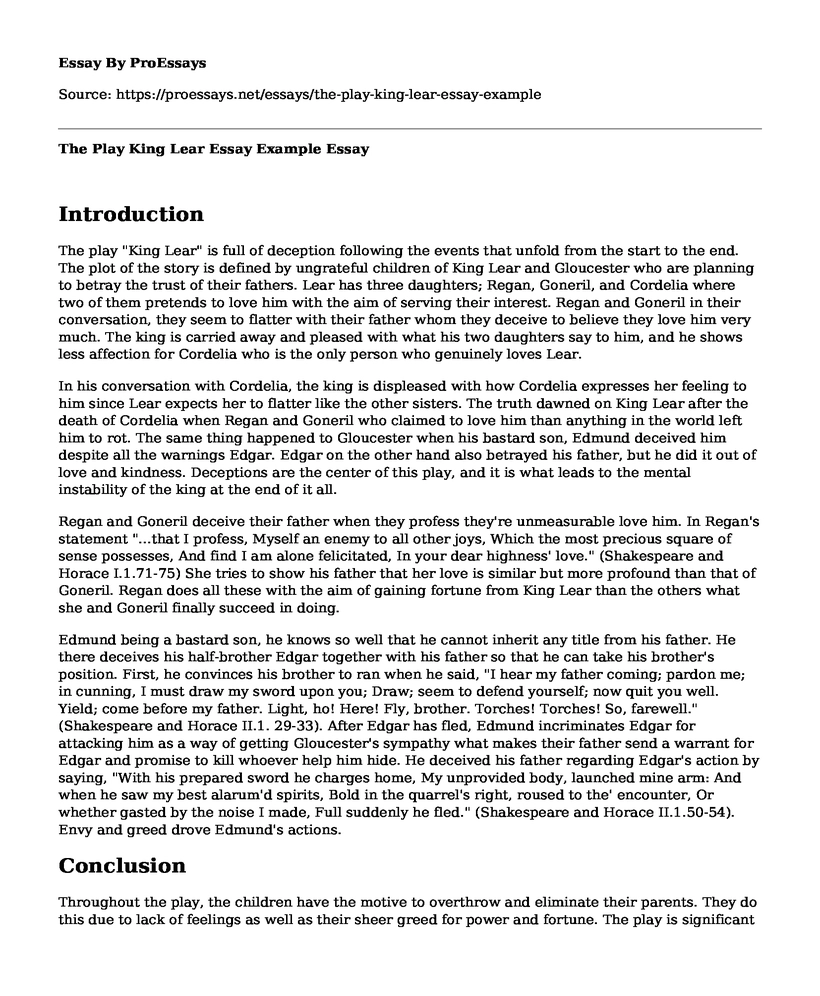Introduction
The play "King Lear" is full of deception following the events that unfold from the start to the end. The plot of the story is defined by ungrateful children of King Lear and Gloucester who are planning to betray the trust of their fathers. Lear has three daughters; Regan, Goneril, and Cordelia where two of them pretends to love him with the aim of serving their interest. Regan and Goneril in their conversation, they seem to flatter with their father whom they deceive to believe they love him very much. The king is carried away and pleased with what his two daughters say to him, and he shows less affection for Cordelia who is the only person who genuinely loves Lear.
In his conversation with Cordelia, the king is displeased with how Cordelia expresses her feeling to him since Lear expects her to flatter like the other sisters. The truth dawned on King Lear after the death of Cordelia when Regan and Goneril who claimed to love him than anything in the world left him to rot. The same thing happened to Gloucester when his bastard son, Edmund deceived him despite all the warnings Edgar. Edgar on the other hand also betrayed his father, but he did it out of love and kindness. Deceptions are the center of this play, and it is what leads to the mental instability of the king at the end of it all.
Regan and Goneril deceive their father when they profess they're unmeasurable love him. In Regan's statement "...that I profess, Myself an enemy to all other joys, Which the most precious square of sense possesses, And find I am alone felicitated, In your dear highness' love." (Shakespeare and Horace I.1.71-75) She tries to show his father that her love is similar but more profound than that of Goneril. Regan does all these with the aim of gaining fortune from King Lear than the others what she and Goneril finally succeed in doing.
Edmund being a bastard son, he knows so well that he cannot inherit any title from his father. He there deceives his half-brother Edgar together with his father so that he can take his brother's position. First, he convinces his brother to ran when he said, "I hear my father coming; pardon me; in cunning, I must draw my sword upon you; Draw; seem to defend yourself; now quit you well. Yield; come before my father. Light, ho! Here! Fly, brother. Torches! Torches! So, farewell." (Shakespeare and Horace II.1. 29-33). After Edgar has fled, Edmund incriminates Edgar for attacking him as a way of getting Gloucester's sympathy what makes their father send a warrant for Edgar and promise to kill whoever help him hide. He deceived his father regarding Edgar's action by saying, "With his prepared sword he charges home, My unprovided body, launched mine arm: And when he saw my best alarum'd spirits, Bold in the quarrel's right, roused to the' encounter, Or whether gasted by the noise I made, Full suddenly he fled." (Shakespeare and Horace II.1.50-54). Envy and greed drove Edmund's actions.
Conclusion
Throughout the play, the children have the motive to overthrow and eliminate their parents. They do this due to lack of feelings as well as their sheer greed for power and fortune. The play is significant to those who tend believes things blindly especially when people do things to impress them. One should be able, to identify the truth in every statement others tell them.
Work Cited
Shakespeare, William, and Horace Howard Furness. King Lear. Courier Corporation, 1908.
Cite this page
The Play King Lear Essay Example. (2022, Mar 29). Retrieved from https://proessays.net/essays/the-play-king-lear-essay-example
If you are the original author of this essay and no longer wish to have it published on the ProEssays website, please click below to request its removal:
- Heart of Darkness Analysis
- The House on Mango Street: Literary Analysis
- Empathy for the Character Hamlet in Hamlet by William Shakespeare: Literarture Analysis Essay
- The Yellow Wallpaper Interpretation Essay
- Satire: A Tool for Expressive Criticism in the Contemporary World - Essay Sample
- Machiavelli's 'The Prince' - Essay Sample
- Essay Example on Two Teens, Uncertain Death: Love, Life and The Fault in Our Stars







